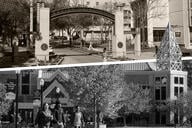You have /5 articles left.
Sign up for a free account or log in.

Wikimedia Commons
Friday's Supreme Court decision that states must authorize and recognize gay and lesbian marriages could create major legal challenges for religious colleges -- primarily evangelical Christian colleges that bar same-sex relationships among students and faculty members. Or the decision may not create much of a legal challenge at all. Or it may create challenges, but not soon.
Legal experts are divided. But the question of whether same-sex marriage as a national right changes the legal status of Christian colleges is no longer just theoretical.
For the majority of colleges that do not bar same-sex relationships, the decision won't change very much, or may simplify things. Many colleges and universities embrace the same-sex partnerships or marriages of their students and employees, and accord them the same benefits as straight couples. In states without same-sex marriage rights, many colleges have offered or tried to offer domestic partner benefits (which some state governments by legislation or political influence have blocked at public institutions). Colleges that were not comfortable offering health insurance to employees when not all employees could get marital or family coverage no longer face that prospect, as everyone has equal marriage rights.
Not all religious colleges -- even those from faiths that oppose same-sex marriage -- may be affected by the Supreme Court's decision. The Roman Catholic Church, for example, is a vocal opponent of same-sex marriage. But Roman Catholic colleges do not bar people in same-sex relationships from enrolling or being hired. And as states have recognized same-sex marriage, many Catholic colleges, such as the University of Notre Dame, have extended health and other benefits to the gay and lesbian partners of employees. As a result of such policies, Catholic colleges are unlikely targets for those who want religious colleges to fully respect gay and lesbian marriages.
Some Past Articles on Academe and Same-Sex Marriage and Benefits
- 2005: A professor describes leaving Virginia Tech (in a state that had just passed a law against gay marriage) and taking her grants with her to the University of Massachusetts at Amherst, in a state with same-sex marriage.
- 2006: The University of Louisville adopts a domestic partner policy when a scientist it was recruiting balks at enrolling without health coverage for her partner.
- 2007: A gay president gets married.
- 2007: A community college board, on a tie vote, rejects health insurance for the domestic partners of employees, but adds benefit of paying some costs for health coverage for pets.
- 2007: After some states bar partner benefits for same-sex partners, public universities try new approaches.
- 2008: Michigan Supreme Court bars state's public universities from offering domestic partner benefits.
- 2008: Lecturer at University of Texas at Austin goes on hunger strike for domestic partner benefits.
- 2012: Political science association hit with boycott threat over conference in Louisiana, which had strong anti-gay-marriage law.
- 2012: Religious colleges debate whether to allow their chapels to be used for same-sex marriages and partnership ceremonies.
- 2013: Scholarly associations file briefs urging Supreme Court to back same-sex marriage rights.
- 2013: Federal judge's ruling helps public college employees with same-sex partners in states without same-sex marriage.
- 2014: College benefits packages evolve as more states recognize same-sex marriage.
But that is not the case for many Christian evangelical colleges, the vast majority of which bar students and faculty members from having gay or lesbian relationships.
And those colleges, some legal experts believe, may now face challenges to their tax-exempt status or other government benefits. "Private institutions that dissent from today's reformulation of marriage must be prepared for aggressive legal attacks on all fronts," said Michael W. McConnell, the Richard and Frances Mallery Professor and director of the Constitutional Law Center at Stanford University Law School.
The Bob Jones University Precedent
The Internal Revenue Service grants tax-exempt and charitable status to colleges and other nonprofit organizations with a range of views on many issues, including issues of faith. Generally, there is a high bar for the IRS to deny such status to a nonprofit college, but a precedent involving Bob Jones University illustrates to some legal observers how Christian colleges' tax status could be challenged now.
In 1970, the Internal Revenue Service adopted a policy that it would not grant tax-exempt status to private schools and colleges that engaged in racial discrimination, saying that as a matter of public policy, such groups could not be viewed as "charitable." That ruling led to a series of disputes with Bob Jones University, which barred the admission of any applicants in an interracial marriage or dating relationship, or who advocated interracial marriage. (Single black students who did not date or marry anyone who was not black were permitted to enroll.) The IRS found these policies to be racially discriminatory and revoked the tax-exempt status of the university.
Bob Jones sued on the grounds that its policies were based on its religious views, and thus should be protected. But in 1982, the U.S. Supreme Court ruled that the IRS was within its rights.
"It would be wholly incompatible with the concepts underlying tax exemption to grant tax-exempt status to racially discriminatory private educational entities. Whatever may be the rationale for such private schools' policies, racial discrimination in education is contrary to public policy," the Supreme Court decision said.
Bob Jones University dropped its ban on interracial dating in 2000. But the university, like many Christian colleges, continues to bar same-sex relationships. On Friday, the university denounced the Supreme Court decision and called it a threat to the religious freedom of colleges like Bob Jones.
What the Decision Says
The decision itself expressed support for the religious liberty and free speech rights of those who oppose same-sex marriage. But the decision does not speak directly to the question of colleges' tax exemptions, and a dissent suggests that religious organizations could be challenged.
In the majority decision, Justice Anthony M. Kennedy wrote: "Finally, it must be emphasized that religions, and those who adhere to religious doctrines, may continue to advocate with utmost, sincere conviction that, by divine precepts, same-sex marriage should not be condoned. The First Amendment ensures that religious organizations and persons are given proper protection as they seek to teach the principles that are so fulfilling and so central to their lives and faiths, and to their own deep aspirations to continue the family structure they have long revered."
In a dissent, Chief Justice John Roberts wrote that the decision's language did not go far enough. "Hard questions arise when people of faith exercise religion in ways that may be seen to conflict with the new right to same-sex marriage -- when, for example, a religious college provides married student housing only to opposite-sex married couples," Roberts wrote.
The chief justice also noted a statement by Donald B. Verrilli Jr., the U.S. solicitor general, in oral arguments about the case.
Justice Samuel Alito Jr., who on Friday dissented from the ruling, asked Verrilli: "Well, in the Bob Jones case, the court held that a college was not entitled to tax-exempt status if it opposed interracial marriage or interracial dating. So would the same apply to a university or a college if it opposed same-sex marriage?"
Verrilli, who was arguing in favor of extending same-sex marriage rights, answered: "You know, I don't think I can answer that question without knowing more specifics, but it's certainly going to be an issue. I don't deny that. I don't deny that, Justice Alito. It is going to be an issue."
How Likely Would Challenges Be?
That statement by the solicitor general has prompted much of the discussion of those who believe tax exemptions could be at risk for Christian colleges. (A college could stick to its policies and give up its tax exemption, but paying taxes on transactions and property, and having donors lose their tax deduction for their contributions, could combine to seriously harm a college's finances.)
Seventy leaders of Christian colleges and schools wrote to congressional leaders this month -- prior to the Supreme Court's ruling -- asking Congress to enact a law to protect religious colleges and schools that want to keep their current policies on gay people. Their letter, citing the solicitor general's statement, said that tax exemptions for Christian colleges would be endangered if the Supreme Court recognized a national right to same-sex marriage. And the letter said that this would be disastrous to Christian colleges and schools.
"The tax exempt status they enjoy helps substantially in enabling them to offer quality education to millions of young Americans. Its loss would be premised on a historic abandonment of the principles of religious liberty that are foundational to our republic and also would have a profoundly adverse financial effect on religious-based primary, secondary, collegiate and postgraduate institutions," the letter said. "If the government could revoke the tax-exempt status of such schools, what is to prevent other forms of government discrimination such as revoking grants or contracts or funding for services unrelated to marriage?"
The authors of the letter are all people who want to preserve the current policies of Christian colleges. But the view that the Supreme Court's decision could result in challenges to Christian colleges' tax exemptions extends to critics of their policies.
Michael A. Olivas, director of the Institute for Higher Education Law and Governance at the University of Houston and author of The Law and Higher Education, said that the Supreme Court ruling should prompt Christian colleges to rethink their policies. "In an area of social change that is as well defined as this issue is, why would any college want to violate the law by banning relationships that are not only legal, but if they led to marriage would be legal and recognizable in every jurisdiction in the country?" he asked
Olivas said that this issue will likely play out as the Bob Jones case did. The policies Bob Jones defended were once reflected by public policy, and so are the policies Christian colleges are defending. But public policy changed in both instances, he said.
"it is one thing to premise behavior bans on what was illegal at one time," he said, noting that Bob Jones's policies against interracial dating were once consistent with South Carolina law. "But if you liken this historical period to that one, it is clear that public policy has changed with regard to the underlying illegality or inability to effectuate a marriage as same sex. That is no longer a shield," he said.
Olivas said he could see a "small" exemption for seminaries that train clergy, but not for most Christian colleges that train undergraduates and students for a variety of careers other than becoming a member of the clergy. For most religious institutions, he said, they would need to renounce tax exemptions to maintain their policies. "They can't have it both ways," he said.
Protection for Religious Views
The Council for Christian Colleges and Universities issued a statement Friday that focused on Justice Kennedy's reference to religious freedom, and that argued that this should protect Christian colleges.
"The Supreme Court’s affirmation of the First Amendment draws from a deep well of precedent that protects free exercise. Free exercise has long been regarded as a fundamental right under the First Amendment, ensuring religious individuals and organizations can exercise their beliefs not only in synagogues, mosques and churches, but also beyond their walls. These full protections for religious individuals and organizations to exercise their beliefs privately and publicly are not diminished by expanded marriage rights," said the statement.
"Christian colleges are places where students are taught to be people of integrity, people of character, people who pay back their loans. They are institutions whose graduates contribute to the public good as artists, health care providers, educators, public servants and entrepreneurs. At the core of this work are deeply held religious beliefs. The Supreme Court’s majority opinion named with respect the plurality of religious beliefs throughout the United States, and specifically affirmed the space in the public square for individuals to have those beliefs and opinions."
The council's statement closed by saying: "It stands to reason, then, that the tax-exempt status and religious hiring rights of religious institutions will be protected when they advance the religious mission of a college or university."
Thomas Wilson, professor of law at Biola University, a Christian institution that has policies of the sort that some fear may be endangered, said via email that he thought there was a good chance Christian colleges would be able to maintain their views. The decision says that "a state [Wilson's emphasis] cannot refuse to acknowledge same sex marriage. It does not specifically set out legal responsibilities for churches or Christian universities. It may not have intended to do so," he said.
Steve Sanders, associate professor of law at Indiana University at Bloomington, who has worked on behalf of legal equity for gay people, said he did not expect that Christian colleges would lose tax-exempt status. Sanders noted the ways that protections for gay people, even after Friday's ruling, do not equal those for people of all races at the time of the Supreme Court's ruling in the Bob Jones case.
"It's very important to recall that there is currently no federal law prohibiting discrimination on the basis of sexual orientation in employment, education or any other area, and many states still lack such policies. That's a much different situation than was the case in Bob Jones, where federal law had prohibited race discrimination for almost two decades under the 1964 Civil Rights Act," Sanders said via email. "So until federal law addresses that more basic question of discrimination, I think the fears of the religious colleges are unfounded and premature."
A Long and Contested Process
Rod Smolla, who starts this week as the dean of Widener University Delaware Law School and is the author of The Constitution Goes to College, said he could see legal challenges for Christian colleges, but that the process would be a long one and they may have protections that were not available to Bob Jones, he said.
Smolla noted that nothing would happen quickly, as the IRS would need to adopt a policy about colleges that don't treat gay people equally and state tax agencies would have to do the same. That is "a policy and political decision," he said, adding that it is "difficult to know whether government agencies would take that step, or just leave nonprofits alone on this issue, at least in the near future."
Then, if the IRS did so, and challenged tax exemptions, Smolla said that litigation would likely result. In that litigation, he said, Christian colleges would likely cite the Religious Freedom Restoration Act (a federal law that many states have versions of, designed to prevent government actions that would force religious people or organizations to violate their beliefs). That law was enacted in 1993, so it was not something Bob Jones could cite. Smolla said that cases involving the act "have been extremely close," so it's hard to predict if it would shift courts away from the precedent involving Bob Jones.
As a result of all of these factors, he said, government is likely to "go slow" in questioning Christian colleges' tax-exempt status.
Olivas of the University of Houston acknowledged this possibility, but predicted that the issue will eventually be addressed. "There is a tension, to be sure, if colleges try and carve out such enclaves and evade their obligations, such as has been happening with some religious colleges that do not want to implement" the new health care law. "The administration has treated them gingerly, but at some point, the outlier colleges will not accommodate or yield. Then, the cases will carve out a common law. But this is dangerous ground, and they will have to act carefully. If it is a clash, it will have to be addressed by the courts."




